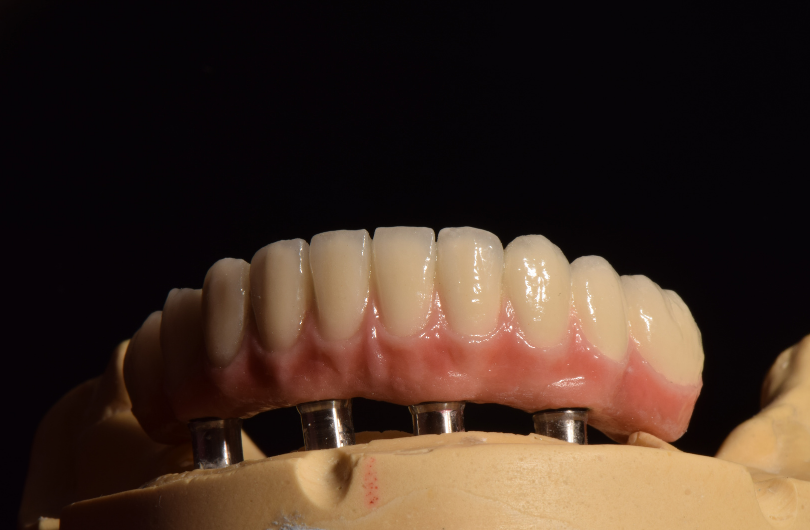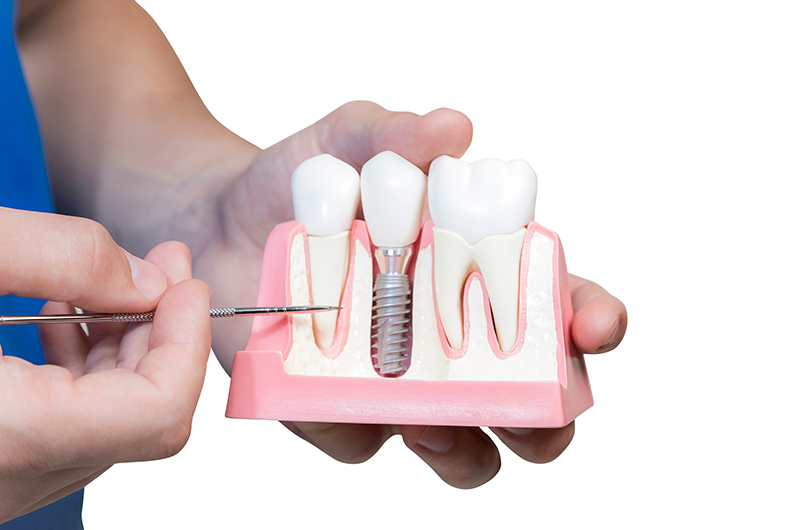Reasons to Get Dental Implants
- Better chewing capability
- Helps fill out the face which can appear "sunken" because of missing teeth Prevents shifting and migration of existing teeth
- Can be used to secure a denture in place
- Are you a candidate for implants?
- If you are in good health and have adequate bone support, you are a good candidate for an implant. Even if some bone loss exists, the technology with dental implants allows for many more people to have this procedure done.
Implants Can Replace Multiple Teeth
If you are missing all your teeth, an implant supported denture can replace the missing teeth. Because the bone in your jaw actually grows around the implants, an implant supported denture tends to be comfortable and stable. This allows you to bite and chew more naturally.
Nothing can take the place of natural teeth, but dental implants can come close. Teeth are made to work together as a functioning unit. When a tooth or teeth are lost, the opposing teeth may shift up or down towards the space. Teeth on either side of the missing tooth begin to shift and migrate, disrupting the balance of the bite. This bite imbalance can cause loss of jaw bone, premature wear on teeth and even gum disease.
The Dental Implant Process
To begin the process we utilize digital x-rays combined with a highly sophisticated computer generated cone beam CT scanning to render a 30 image of your jaw.
This allows us to precisely determine exactly where the implant can be placed in order to allow for maximum success.
Implants to Replace One Tooth
After the dentist places the implant into the jaw it usually takes 3-5 months for the implant to integrate into the jaw bone until it is secure enough to begin having the crown or bridge made.
A single tooth implant restoration is made up of three parts: • Dental implant • Implant abutment • Implant crown
After the implant is determined to be strongly integrated into the bone, an appointment is made to take impressions which will allow the laboratory to fabricate the final prosthesis. During the second and final appointment, an abutment is secured into the implant. Finally, the crown is cemented on top of the abutment to permanently replace the missing tooth.
Missing Teeth? Why not “grow” new ones?
What are Dental Implants?
Dental implants are artificial tooth roots that connect to the jawbone, providing a long-term base for secure, stable and comfortable tooth replacement. It becomes a stable base for one or more replacement teeth. They function as anchors that replace your natural tooth roots. Implants are made of titanium and other materials that are compatible with the human body.
Patients may choose dental implants to replace a single tooth, several teeth or to support partial or full dentures.
Dental implants are fast becoming the new standard in tooth replacement. They are a popular and effective long-term solution for people who suffer from weak teeth, missing teeth or chronic dental problems.
Dental implants are statistically, the most successful treatment in dentistry. More people are choosing implants instead of replacing a tooth by grinding down healthy teeth on either side of the missing tooth to have a bridge. Dental implants are the only dental restoration that actually stimulates growth of bone, thereby strengthening the jaw.


